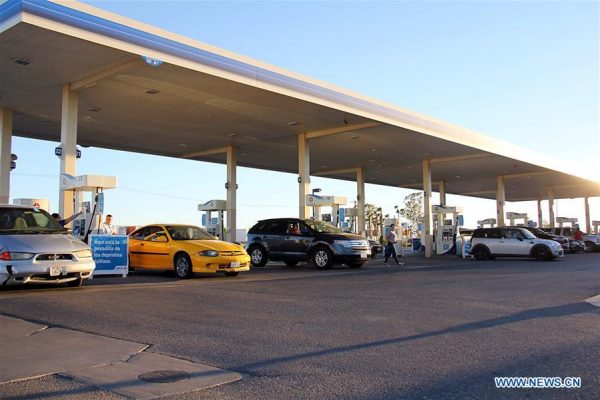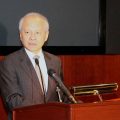
EL CENTRO, the United States, Aug. 18 (Xinhua) — For many residents who live on the U.S.-Mexico border, Arco gas station, where gasoline is roughly 20 or more cents cheaper than it is at most gas stations in Imperial County, California, is the best choice to save a couple of bucks.
Several years ago, nobody believed the gas station could be successful, because it is not located along the main street.
However, because of the rapid growth of trade between Mexico and the U.S in recent years, the gas station along with the ampm convenience store attached to it in Heber, Imperial County, which is 7 kilometers away from the border inspection station, thrived.
Thousands of vehicles now came to the gas station with 24 pumps, which run 24 hours a day, for fueling. So far, the monthly total of the gas station and ampm store has well surpassed 2 million, which was way beyond other gas stations in the region.
It is a benefit from the North America Free Trade Agreement (NAFTA), Cecilia Hernandez, manager of Arco gas station, told Xinhua.
“I think NAFTA work both ways (U.S. and Mexico both benefit from each other). Because especially here in the Imperial Valley, we live right on the border, so we depend on them to be able to come here and buy goods here. They also depend on us so they can live a better life.”
As the renegotiation of NAFTA is underway in Washington D.C., ordinary people living on the U.S.- Mexico border, who have benefited from NAFTA for years, held different opinions.
“For the past 23 years, it (NAFTA) has been working for America, Mexico and Canada. Every country benefits from each other. So why change something that has been working for so many years?” local resident Antonio Valenzuela told Xinhua.
Valenzuela “totally disagree” with U.S. president Donald Trump. “A new administration and a new president, doesn’t mean you have to change everything,” he said.
“There shouldn’t be any changes to it (NAFTA), because it will only affect Mexico’s economy, U.S. economy and Canada’s economy,” he added.
According to a recent report released by Community and Economic Development Department of the Imperial County, more than 52,000 crossing the border on a daily basis for working or shopping.
Calexico is a smaller town divided by fence with Mexicali, a Mexican city. According to the report, the Calexico/Mexicali border crossers in personal vehicles and on foot account for “a total of approximately 380 million U.S. dollars in spending on retail items and groceries in Imperial Valley.”
And the total spending in Imperial County in 2016 on retail, food, and drink (spending in restaurants and bars was excluded) was 1.93 billion U.S. dollars. That means the group contributed approximately 20 percent of the total spending in Imperial County in 2016 on retail and groceries.
According to Esperanza Colio Warren, the Commmunity and Economic Development Manager, “the border crossers from Mexico spend an average of 140 U.S. dollars per week in the Imperial Vally, which equals about 7,280 U.S. dollars per person per year.”
In El Centro, the largest city in the Imperial Valley, 6.8 kilometers north of Calexico, a Holiday Inn Express hotel first opened to business ten years ago. At that time, local residents here believed motels were good enough for this city, about 350 kilometers southeast to Los Angeles.
But now, with the development of border trading, El Centro is growing and getting international, with chain restaurants and supermarkets. In Calexico, many of the shop owners are Korean.
“As a matter of fact, I understand most businesses believe that NAFTA has increased export to Canada and Mexico. So that’s a good thing for the United States. Here in Imperial County, it’s a good thing because we have the trade that is going back and forth. We believed it has not only created jobs in Mexico, but also created some jobs in the U.S,” Ralph Cordova, CEO of Imperial County, told Xinhua.
Trump, who on the election campaign trail last year called NAFTA “the worst trade deal signed maybe anywhere,” has blamed the 23-year-old trade agreement for the lost of American jobs in automobile factories.
However, Raymond R. Castillo, Imperial County Supervisor, believed that U.S. benefit even more from NAFTA.
“Because the U.S. is in the middle and we have the Canadian border and the southern border with Mexico. If you look at the communities in Texas, New Mexico, Arizona and California, it has brought a lot of jobs,” Castillo told Xinhua.
According to the Imperial County Comprehensive Economic Development Strategy, Mexico now is California’s highest ranking trading partner. Over 30 percent of the trading products come through the two land ports in Calexico. Mexico now imports some 18.5 billion U.S. dollars of agriculture products every year, making it one of the most important markets for U.S. farmers, according to local media reports.
Many thought there was nothing much to worry about. “I think the talks of negotiating NAFTA is just what Trump wanted. He said many things that has been changed in a second,” said James Lo, President of Imperial Chinese Chamber of Commerce.
Of course, NAFTA may not be a perfect trade. “There are some areas where they need tweak. In other words, there’s always a way you can improve,” said John R. Renison, Imperial County Supervisor.
“There’s nothing wrong with looking at it, revising it and amending it. But it has to be fair. You just cannot go in there and say we are gonna throw it away. I don’t think that’s a solution.”
Renison thought three countries should work together, and he believed “we will.”


